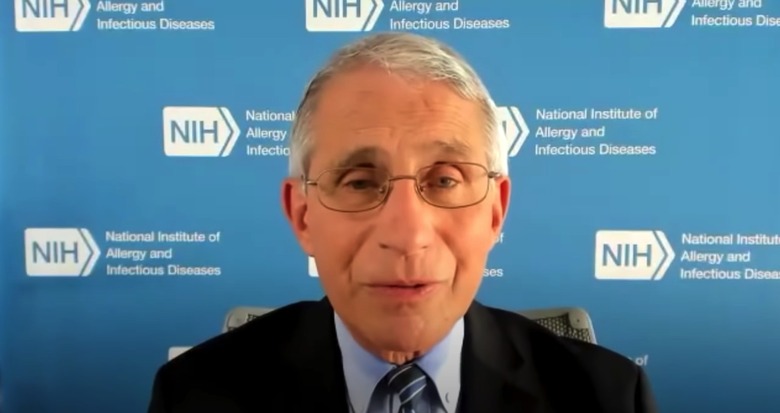Dr. Fauci Just Said Four Crucial Words That Everyone Needs To Remember
- Even as the number of coronavirus cases in the U.S. surges, Dr. Fauci recently stressed that the pandemic will eventually come to an end.
- In a best-case scenario, Fauci believes an effective vaccine candidate will be approved as early as November of this year.
- 49% of Americans, however, recently indicated that they would avoid a coronavirus vaccine due to concerns about side effects.
The coronavirus pandemic is still raging across the United States and, truth be told, the situation is likely to get worse before it gets better. With fall in full swing and winter around the corner, colder temperatures and the impending flu season will likely cause a massive spike in new coronavirus cases according to health experts. What's more, the current state of the coronavirus in the U.S. is far from encouraging given that the rate of new coronavirus infections is still rising at a steady clip.
Still, it's worth remembering that the coronavirus will, at some point, be something we can firmly put in the rearview mirror. In an ideal scenario, a vaccine will be developed and approved towards the end of the year and, if all goes well, administered to the entire country before 2022. Of course, in the interim, people should still adhere to safety guidelines such as social distancing, proper hand hygiene, and mask-wearing when appropriate.
While Dr. Anthony Fauci has recently expressed concern over the way some states are handling the coronavirus, he did recently tell Wired that the coronavirus will eventually stop being an ongoing concern.
"This outbreak will end," Fauci said. "We will get a vaccine. And if we combine a vaccine with prudent public health measures, we can put this behind us."
Fauci also stressed the importance of remaining vigilant in the fight against the coronavirus. Other health professionals have echoed this same sentiment, noting that restaurants and bars reopening shouldn't result in people taking coronavirus safety measures any less seriously.
"Despair makes you throw your hands up and say, it doesn't matter what I do, what's going to happen is going to happen," Fauci added. "That is incorrect. It does matter what we do. And if we do it for a while longer, we will look behind us and the outbreak will be behind us, not among us."
All that said, there is any number of unknowns regarding a potential coronavirus vaccine. Even if we assume that a vaccine candidate gets approved later this year, there's no indication as to how effective such a vaccine might be. Fauci previously said that the first coronavirus vaccine may only be effective 50-60% of the time. What's more, the first coronavirus vaccine will likely require individuals to take multiple doses. This, in turn, would reduce the available quantity of doses and lengthen the amount of time necessary to administer the vaccine to the entire country.
As a final aside, it's worth pointing out that 49% of Americans — according to a recent Pew Research Center study — indicated that they wouldn't take a coronavirus vaccine due to safety concerns about possible side effects. Additionally, the overall interest in a COVID-19 vaccine appears to be waning. While a survey back in May revealed that 42% of respondents would be willing to take a coronavirus vaccine, that number dipped down to 21% as of September.
